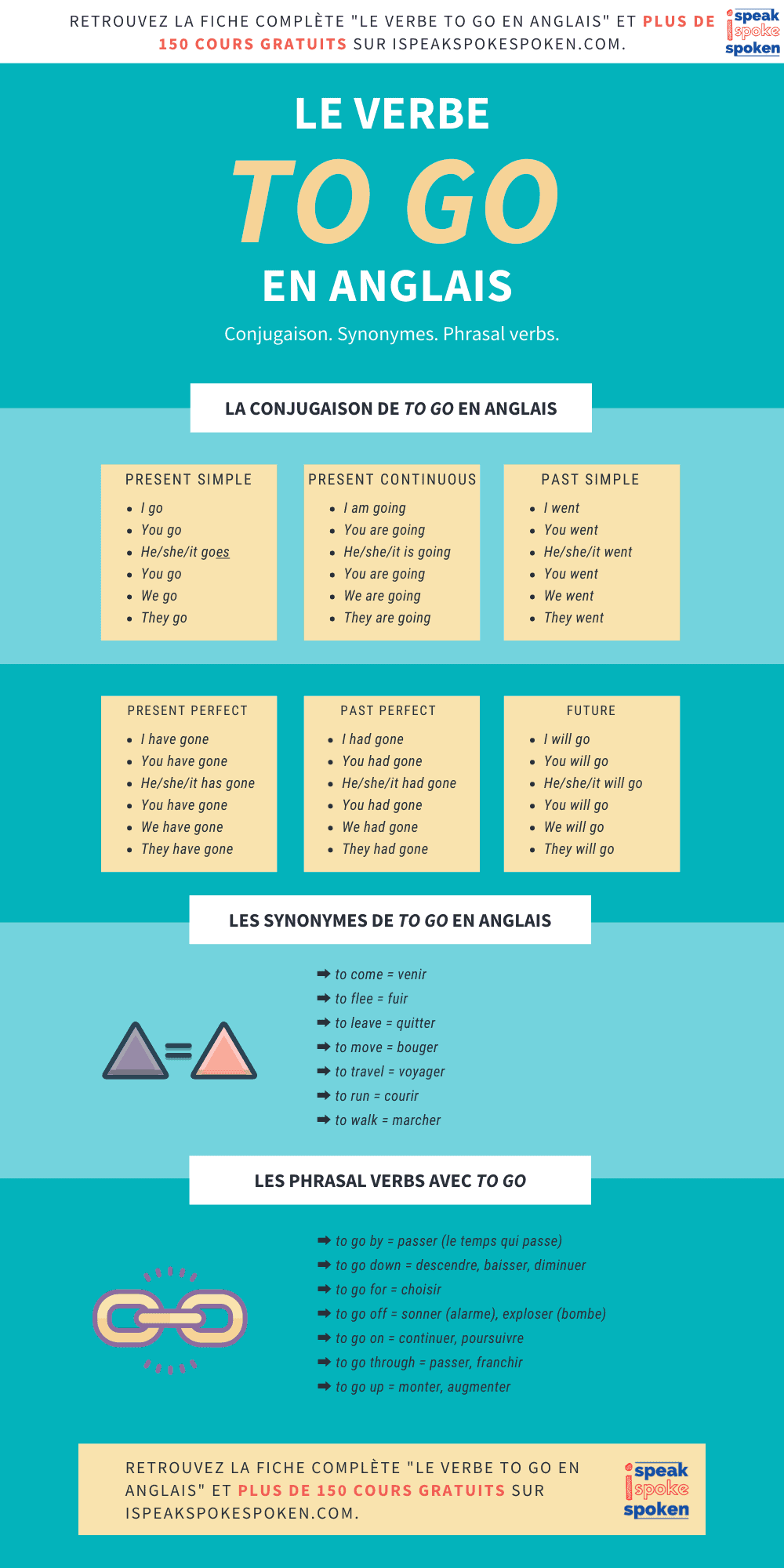¿Cómo se conjuga el verbo to go en inglés? ¿Qué significa este verbo tan común y qué phrasal verbs se asocian con él? ¿Cómo utilizarlo en expresiones idiomáticas y encontrar sinónimos adecuados?
Tabla de conjugación de to go en inglés
Conjugación del verbo go en el indicativo
Verbo go en present simple
- I go
- You go
- He/she/it goes
- We go
- You go
- They go
Verbo go en present continuous
- I am going
- You are going
- He/she/it is going
- We are going
- You are going
- They are going
Verbo go past simple
- I went
- You went
- He/she/it went
- We went
- You went
- They went
Verbo go en past continuous
- I was going
- You were going
- He/she/it was going
- We were going
- You were going
- They were going
Verbo go en present perfect
- I have gone
- You have gone
- He/she/it has gone
- We have gone
- You have gone
- They have gone
Verbo go en present perfect continuous
- I have been going
- You have been going
- He/she/it has been going
- We have been going
- You have been going
- They have been going
Verbo go en past perfect
- I had gone
- You had gone
- He/she/it had gone
- We had gone
- You had gone
- They had gone
Verbo go en past perfect continuous
- I had been going
- You had been going
- He/she/it had been going
- We had been going
- You had been going
- They had been going
Verbo go en future
- I will go
- You will go
- He/she/it will go
- We will go
- You will go
- They will go
Verbo go en future continuous
- I will be going
- You will be going
- He/she/it will be going
- We will be going
- You will be going
- They will be going
Verbo go en future perfect
- I will have gone
- You will have gone
- He/she/it will have gone
- We will have gone
- You will have gone
- They will have gone
Verbo go en future perfect continuous
- I will have been going
- You will have been going
- He/she/it will have been going
- We will have been going
- You will have been going
- They will have been going
Conjugación del verbo go en condicional
Verbo go en conditional present
- I would go
- You would go
- He/she/it would go
- We would go
- You would go
- They would go
Verbo go en conditional present continuous
- I would be going
- You would be going
- He/she/it would be going
- We would be going
- You would be going
- They would be going
Verbo go en conditional perfect
- I would have gone
- You would have gone
- He/she/it would have gone
- We would have gone
- You would have gone
- They would have gone
Verbo go en conditional perfect continuous
- I would have been going
- You would have been going
- He/she/it would have been going
- We would have been going
- You would have been going
- They would have been going
Otras formas
El infinitivo de go
- to go
Participio presente de go
- going
Participio pasado de go
- gone
El imperativo de go
- go
- let’s go
Como to fly, to eat, to catch, to speak y to meet, to go es un verbo irregular. Por lo tanto, debemos prestar especial atención al past simple y al participio pasado.
Definición de go en inglés
¿Qué significa el verbo go en español?
El Cambridge Dictionary ofrece varias definiciones del verbo go.
Veamos las principales:
1. To travel or move to another place
We went to Glasgow two years ago.
→ Fuimos a Glasgow hace dos años.
2. To move or travel somewhere in order to do something
She goes running after work.
→ Sale a correr después del trabajo.
3. To leave a place, especially in order to travel to somewhere else
It’s late, I have to go home now.
→ Se hace tarde, tengo que volver.
4. To become
Your coffee is going cold. Drink it!
→ Se te está enfriando el café ¡Tómatelo!
5. To operate (in the right way)
My car won’t go when I press the gas.
→ Mi coche no arranca cuando piso el acelerador.
6. If a period of time goes, it passes
Why do the holidays go so fast?
→ ¿Por qué pasan tan rápido las vacaciones?
7. To use your opportunity to play in a game
Give him the dice! It’s not your turn to go.
→ ¡Dale los dados! No es tu turno.
8. To look or be acceptable or suitable
This dress goes well with my favorite pair of boots.
→ Este vestido combina muy bien con mis botas favoritas.
Para consultar la página completa del Cambridge Dictionary, haz clic aquí.
Phrasal verbs con go en inglés
Recordatorio: los phrasal verbs (o “verbos con partícula”) son verbos que, al ir seguidos de otra palabra (la partícula), completan o modifican su significado inicial.
Estos son los phrasal verbs formados a partir del verbo go:
- Go after → perseguir, efectuar
- Go along → Avanzar, progresar
- Go away → Irse
- Volver atrás → Volver
- Go by → Pasar (tiempo)
- Go down → Descender
- Go for → Elegir
- Go in → Entrar
- Go into → Entrar en, penetrar
- Go off → Sonar (alarma), explotar (bomba)
- Go on → Continuar
- Go out → Salir, salir juntos (pareja)
- Go over → Ser recibido (mensaje)
- Go through → Atravesar, franquear
- Go up → Subir, aumentar
- Go with → Acompañar a alguien
- Go without → Ir sin, estar sin
Sinónimos de go en inglés
Según el contexto, se puede sustituir el verbo go por uno de los verbos siguientes:
Expresiones con go en inglés
Aquí tienes una lista no exhaustiva de expresiones idiomáticas con el verbo go:
- go amiss → torcerse, de forma errónea
- go ballistic → flipar (coloquial)
- go begging → mendigar
- go crazy → volverse loco (coloquial)
- go downhill → ir cuesta abajo
- go for broke → ir a la quiebra
- go for it! → ¡A por ello!
- go haywire → volverse loco (coloquial)
- go mad→ volverse loco, perder los papeles (coloquial)
Dificultades con el verbo go en inglés
El uso del verbo to go conlleva una serie de escollos, sobre todo para algunos hablantes nativos de inglés. Vamos a ver una lista de los principales.
¿Cuál es la diferencia entre been y gone?
Have been es el verbo to be conjugado en present perfect. Have gone es el verbo to go también conjugado en present perfect. En muchos contextos, una u otra de estas fórmulas pueden utilizarse independientemente para evocar la idea de viaje o desplazamiento. Por ejemplo, podríamos decir:
- We’ve been to Colombia a couple of times.
- We’ve gone to Colombia a couple of times.
Estas dos frases significan:
- Hemos estado dos veces en Colombia.
Sin embargo, algunas situaciones obligan a elegir entre have been y have gone. Echa un vistazo:
- Judy has been to Chili.
- Judy has gone to Chili.
La formulación nº1 (con been) implica que Judy fue a Chile pero ya ha vuelto. En cambio, la formulación nº2 (con gone) implica que Judy se fue a Chile pero sigue allí.
Por lo tanto, debes:
- utilizar el participio been para referirte a uno o varios viajes que ya han tenido lugar
- utilizar el participio gone para referirte a un viaje del que el sujeto aún no ha regresado
¿Cuál es la diferencia entre go y get?
En contextos relacionados con viajes o desplazamientos, los verbos ingleses to go y to get tienen significados similares. Vamos a ver cuándo optar por uno u otro.
Insistir en la llegada
Opta por get a go para hacer hincapié en la llegada. Por ejemplo:
I promise I’ll phone you as soon as I get to Denver.
→ Prometo llamarte en cuanto llegue a Denver.
Salir o entrar en un vehículo
Para autobuses, trenes y aviones, utilizaremos get on y get off, pero no go on o go off. Por ejemplo:
When Steve got off the bus, I noticed he looked exhausted.
→ Cuando Steve se bajó del autobús, me di cuenta de que parecía agotado.
Convertirse + ciertos adjetivos
Si go y get se confunden tan a menudo, es también porque ambos pueden significar “volverse”. Sin embargo, es más natural utilizar uno u otro dependiendo de los adjetivos.
Estos son los adjetivos para elegir go:
- los colores: blue, red, green, yellow…
- adjetivos con connotación negativa: mad (loco), bald (calvo), bad (malo)…
Por ejemplo:
I’m going bald, and I’m not even 30!
→ ¡Se me cae el pelo y ni siquiera tengo 30 años!
Estos son los principales adjetivos para elegir get:
- dark (oscuro)
- light (iluminado)
- late (tarde)
- old (viejo)
- sick (enfermo)
- tired (cansado)
- ill (enfermo)
Por ejemplo:
I must go, it’s getting late.
→ Tengo que irme, se hace tarde.
Las construcciones go + verbo -ING y go + infinitivo
El verbo go se utiliza en combinación con un verbo en -ING para referirse a acciones o actividades que implican movimiento.
Ejemplos:
Kim and David have gone shopping.
→ Kim y David se fueron de compras.
All my grandpa could do with his own father was to go fishing.
→ Lo único que podía hacer mi abuelo con su propio padre era ir a pescar.
Por el contrario, si la acción o actividad tiene un principio y un final claramente identificados, no utilizaremos el verbo go seguido de un verbo en -ING sino con un verbo en infinitivo, con la preposición to.
Ejemplos:
Martha and Oliver have gone to watch the rugby final.
→ Marta y Oliver fueron a ver la final de rugby.
El uso de la expresión coloquial go and…
La fórmula go and seguida de otro verbo es una expresión coloquial de la lengua inglesa. Palabra muy común, se utiliza para expresar la desaprobación de algo (una decisión, un acontecimiento…) que ya ha sucedido.
Ejemplos:
Eliza’s gone and lost that purse her boyfriend gave her last week.
→ Eliza ha encontrado la manera de perder el bolso que le regaló su novio la semana pasada.
You’ve really gone and done it now – your dad is going to be furious!
→ Pues bravo, ¡tu padre se va a poner furioso!
En resumen

Puede descargar esta hoja en formato PDF aquí.


